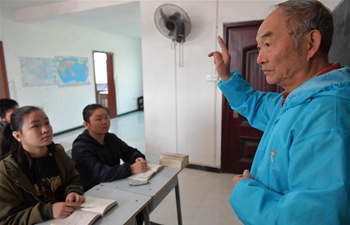NAIROBI, Nov. 27 (Xinhua) -- There is a need for governments and industries to adopt transformational measures in order to curb the emission of carbon and other greenhouse gases (GHGs) responsible for accelerating global warming, a senior UN Environment Program (UNEP) official has said.
The tenth edition of the United Nations Environment Programme (UNEP) Emissions Gap Report was published on Tuesday, warning that the global emissions must fall by 7.6% a year for the next decade to avoid crisis.
Liu Jian, the chief scientist and Science director at UNEP said that reducing carbon emissions require countries to honor their political will, investments in clean energy and a radical change in lifestyles.
"There is an urgent call from the science community for transformational change. We have to change our lifestyle, the way we produce and travel in order to reduce carbon emissions," Liu told Xinhua.
He said the 2019 Emissions Gap report is critical on the need for countries to enhance the implementation of national and global commitments to reduce carbon emissions and stabilize temperatures.
"This report focuses on how much we should do to reduce carbon emissions each year and comes with a very specific figure of at least 7.6 percent reduction globally, said Liu.
He said that progress has been made in the reduction of greenhouse gas emissions yet it is far from enough to reach targets of the Paris Agreement.
Liu said that failure to maintain global temperature rise below the 1.5-degree threshold could worsen climatic shocks and destabilize livelihoods and economy.
"An increase in temperatures would further push the earth ecosystem sliding to its tipping point. One in eight species would disappear in the next decades if we do nothing and you can imagine how the ecosystem would respond once these species are missing from this earth ecosystems" said Liu.
He said that G20 countries that account for more than 75 percent of total carbon emissions globally, must commit more to honor their political leadership to go for low-carbon and clean technologies to propel green development.
Liu said that there is still a small window of opportunity to bridge the carbon emissions gap if we all act quickly enough.
While recognizing the impact of the United States' withdrawal from the Paris climate deal, he appreciates that individual states and corporations have taken encouraging steps to lower carbon emissions and revitalize the green agenda.
"Many states such as California are acting proactively and the business sector in the U.S. fully believe in science and is taking action against climate change," said Liu.
He said the US has not withdrawn from the UN framework convention on climate change (UNFCCC) and could still play an important role if they wish to accelerate low carbon development globally.
Liu said that China's contribution is key to reduce global carbon emissions adding that the Asian nation's massive investment in renewable energy will boost climate resilience and low carbon economy.
He said that the Chinese upper-and middle-income population should adopt sustainable lifestyles and consumption patterns in order to revitalize action to reduce greenhouse gas emissions.
According to Liu, a change of lifestyle among Chinese middle and upper classes that include less ownership of cars, greater use of public transportation and reduction in food waste, is key to halt carbon emissions.
He said that developed countries have a moral obligation to assist Africa to build resilience to climatic shocks despite the continent contributing about 4 percent to global carbon emissions.
"Africa needs to be the priority area for climate adaptation, to build resilience against climate change," said Liu, adding that the continent can leverage on capital, technologies and expertise from developed countries to realize low carbon growth.













